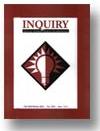Abstract
In the article I choose (Critical Thinking: Distinguishing Between Inferences and Assumptions) the authors focus on two elements of reasoning, inference and assumption. The authors define an assumption as "something that we take for granted or presuppose" and defined an inference as "a step in the mind, by which one concludes something to be true in the light of something else being true.
I will critique this article for the following elements: perception, assumption, emotion, language, argument, fallacy, logic and issue / problem resolution.
Perception
This article is well written, the authors have indicated that they have written other article on critical thinking, so they are versed on this subject. The information was understandable and the paragraphs flowed well from one to the next. Good examples were given to further explain the differences between inference and assumptions.
Assumption
The authors assumed that the audience had a general understanding what critical thinking was about and that their audience was interested in learning more about the elements of reasoning.
Emotion
Even though there was not emotion expressed from the authors in this article, the contents were not bland in nature. The authors did (abstractly) express a passion and understanding for the information conveyed in this article.
Language
The language used in this article was appropriated for the audience that would be reading it. This article was taken for the Journal of Developmental Education, but I feel that a person this article could be easily understood by someone of the college level education.
Argument
This article did not really put forth any arguments or opinions, they purpose of this article was to aid the audience in being able to distinguish between inference and assumption during critical thinking.
Fallacy
There were no contrived beliefs or misleading notions brought forth by the...


